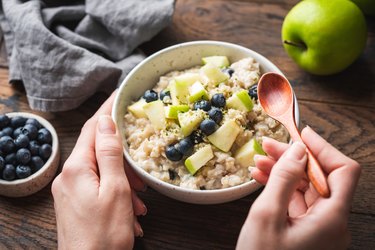
Eating a plant-based breakfast is a great way to start your day (and your health) on the right foot. Case in point: Plant-based eating is linked to reduced risks of chronic diseases like heart disease and diabetes, according to Harvard Health Publishing.
So what exactly is a plant-based diet? While there's no official definition, it's safe to say that plant-based diets focus on eating mostly plants, with some room for animal products. This can look different for everyone — some people choose to be vegan or vegetarian (either every day or one or two days of the week) while others simply cut down on their meat intake and take inspiration from herbivores.
Video of the Day
Video of the Day
While you're already on your way of making a healthy change by choosing a plant-forward breakfast, make sure you're not making any of these plant-based diet mistakes that could derail your health efforts.
1. Eating Only Carbs
One common mistake people make when eating plant-based is relying solely on carbs. This is especially true when it comes to breakfast, where carb-rich foods like cereal, bagels and pancakes are no-brainers.
Relying solely on carbs for breakfast — especially if they're highly processed and refined — is likely to backfire, leaving you tired and hungry in a matter of hours. Rather than eating only carbs at breakfast, or cutting carbs entirely, eating a plant-based breakfast with a variety of whole foods is a good way to ensure you're meeting your macronutrient needs. When you're eating plant-based, you'll want to incorporate healthy plant-based proteins into every meal.
Eating at least 20 grams of protein at each meal can increase satiety, per a June 2015 study in the American Journal of Clinical Nutrition. While this may initially seem challenging on a plant-based diet, it's definitely doable: Make a conscious effort to choose high-protein plant-based breakfast options like tofu, tempeh, whole grains, yogurt and milk alternatives.
Tip
While you're working on increasing your protein intake at breakfast, don't forget about healthy fat sources, such as avocados, nuts, nut butters, seeds and seed butters. Together, these macronutrients have satiating, filling effects to help you feel full for hours after you eat.
2. Choosing High-Sodium Processed Foods
By now, meatless meats are near-ubiquitous. But if your first inclination is to swap breakfast sausages with vegan breakfast sausages, think again.
Vegan breakfast sausages are just one kind of highly processed vegan meat substitutes that are loaded with sodium, saturated fats, preservatives and fillers. Basically, they're not much different — or healthier, for that matter — than typical meat-based breakfast sausages.
Instead of reaching for breakfast sausages, vegan or not, try making a tofu scramble or tempeh breakfast hash for a nutritious, high-protein plant-based breakfast. If you need more inspiration for healthy plant-based breakfasts, refer to any of these high-protein vegan breakfast recipes.
Related Reading
3. Opting for High-Sugar, Low-Protein Yogurts
While traditional yogurt can be a high-protein addition to your breakfast bowl, many vegan or dairy-free options are actually quite low in protein and can often be laden with sugar.
How can you ensure you're picking the right yogurt? Check those nutrition labels. Ideally, your vegan yogurt should have little to no added sugar and at least 5 grams of protein per serving. Generally, it's a good idea to look for plain, rather than flavored, plant-based yogurt to keep these added sugars to a minimum. If you prefer your yogurt to taste sweeter, you can add fruit or sweeten with agave, jam or maple syrup.
If you're having trouble finding a vegan yogurt you enjoy, consider swapping yogurt for plant-based milk alternatives. Some, like soymilk or pea protein milk, have upwards of 7 grams of protein per cup.
4. Relying on Added Fibers
One of the many benefits of a plant-based diet is that you're likely to eat more fiber, even without trying to. A diet high in fiber has a number of health benefits, including promoting normal digestion, lowering cholesterol and controlling blood sugar, according to the Mayo Clinic.
If you're getting your fiber from added fiber rather than fiber from whole foods (like beans and oats), you might not be benefitting from the same health benefits, but further research is needed before we can determine if said benefits are similar.
What exactly is added fiber? Also known as functional fiber, added fiber is extracted from whole foods and added to processed foods — usually to increase their fiber content or achieve the desired consistency. A common example is inulin extracted from chicory root, an ingredient often added to breakfast bars or low-calorie yogurt to boost their fiber content.
You'll want to get the majority of your fiber from sources that are naturally loaded with the nutrient, like fruits, vegetables, whole grains, nuts and seeds.
Related Reading
Was this article helpful?
150 Characters Max
0/150
Thank you for sharing!
Thank you for your feedback!